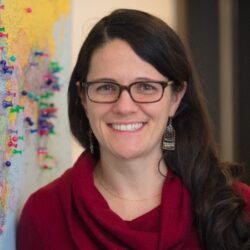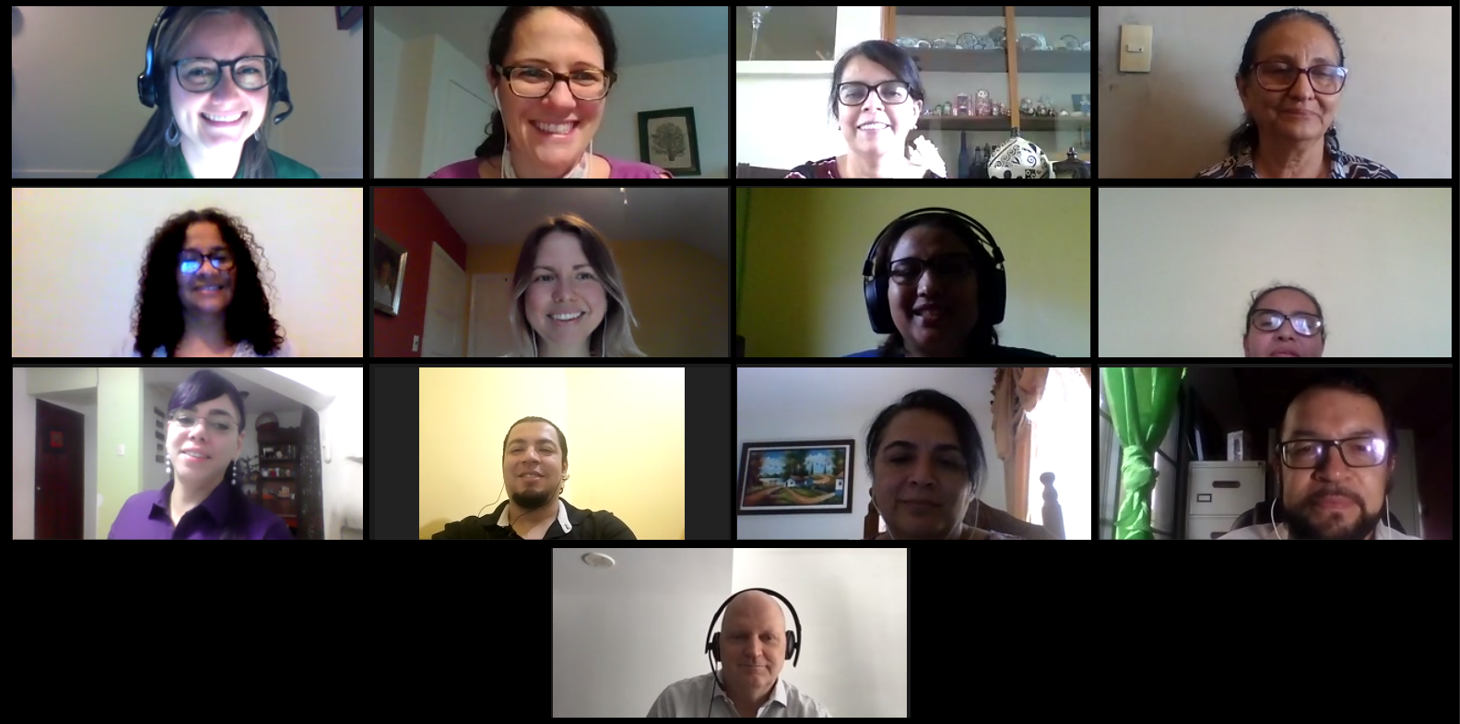Community Spotlight Series: Natalia Dyba & the UW COIL Initiative
June 2nd, 2023
International visitors participating in the Fulbright Korea International Education Administrators Program meet with Natalia Dyba of UW Bothell to discuss the Collaborative Online International Learning (COIL) initiative. May 2022.
In 2019, nearly 92% of Washington residents aged 25 and above were high school graduates or equivalent, and over 65% of people in Seattle over 25 have a Bachelor’s degree or higher. Combined with the fact that major technology companies such as Microsoft, Amazon, Tableau, and Highspot are based in Seattle, the relationship between education and technology in and around Seattle is an important intersection to support and encourage.
The University of Washington (UW), founded in 1861, is the largest university in Washington State with over 45,000 students enrolled in both undergraduate and graduate programs. The UW is the country's top public research institution, with three campuses in Seattle, Tacoma, and Bothell. UW Bothell is the home of the Collaborative Online International Learning (COIL) initiative, also known as international virtual exchange. The COIL program is “an approach to fostering global competence through development of a multicultural learning environment that links university classes in different countries. Using various communication technologies, students complete shared assignments and projects, with faculty members from each country co-teaching and managing coursework.” The COIL Fellows program, now conducted in close partnership with the UW Tacoma campus, was founded in 2014, and links UW courses with courses in different countries through a variety of real-time and asynchronous technologies.
The COIL initiative has built partnerships with many global establishments to strengthen cultural, educational, and technological ties around the world through the implementation of international learning in conversations, assignments, themes, or work collaborations. In partnership with the World Affairs Council of Seattle, representatives of COIL have met and continue to meet with international leaders from around the world, participating in exchange programs such as the International Visitor Leadership Program (IVLP), Fulbright, and more. Experts of COIL have participated in meaningful discussions with several groups of international visitors since 2015, providing insight into their work on a wide array of topics ranging from Transforming Education in the Digital Age to El Salvador-U.S. Exchange Programs and the Industries of the Future. Natalia Dyba is in charge of maintaining many of COIL’s long-standing partnerships and arranging opportunities for experts of COIL to meet with their international counterparts. She continues to ensure that every international visitor feels engaged and comfortable participating in COIL and that every experience fosters fruitful conversation and new ideas.

As the Director of Global Initiatives at UW Bothell, Natalia Dyba (pictured right) supports the growth of international efforts across campus, including education abroad, institutional partnerships, curricular integration, and opportunities for international involvement locally. Prior to coming to UW Bothell, she worked for the Institute of International Education on developing and implementing an innovative scholarship program for a new university in Saudi Arabia. In 2007, she was a Fulbright Student Scholar at the National University of Mar del Plata in Argentina, and in 2017 she participated in the Fulbright-Nehru International Education Administrators program to India. She has a deep commitment to exchanges due to their role in her own life and wants to support them however she can through the roles she occupies.
This past July I had the wonderful opportunity to connect with Natalia for a virtual interview to discuss her experience partnering with the World Affairs Council’s Global Leadership Exchange (GLX) Program. In our interview she provides insight into her involvement and experiences with our IVLP visitors throughout the years, as well as the importance of making exchanges as accessible as possible through technology. What follows is a summary of our conversation.
What has been your experience meeting with international visitors through exchanges? Is there a specific program, meeting, experience that stood out to you the most, and why?
All the World Affairs Council programs that I have participated in have been technology based and centered around my work with COIL. There have been several standout meetings. A particularly memorable group was one that came during one of Seattle’s big Snowmaggedons in February 2019 (a program focused around Education in the Digital Age). It was pre-pandemic and all the shutdowns that came with it, but due to the amount of snow and ice on the roads, getting the visitors to Bothell was impossible. The World Affairs Council and UW Bothell decided to go virtual and were successful in hosting the meeting, paving the way for all the virtual events that were to come during the pandemic and beyond.
Another highlight was when one of the COIL presenters, who was born in Iraq, met a member of an IVLP program who is also Iraqi, and they were able to make connections to a small town in Iraq and serendipitously finding each other halfway across the globe.
Why do you continue to meet with our visitors and why is this important to you and the COIL program?
Meeting with international visitors is mutually beneficial for both the visitor and the institution. Continuing to meet visitors is vital to the COIL program and an immediate action to react to when opportunities such as working with the World Affairs Council arise. The virtual exchange needs partners and establishes the University of Washington Bothell as an internationally involved institution.

International visitors participating in the IVLP Virtual U.S. Higher Education and Opportunities for Future Partnerships meet with Natalia Dyba of UW Bothell to discuss the Collaborative Online Learning (COIL) initiative. November 2020.
Have you kept in contact with the international visitors after they left Seattle?
Several delegates from different programs became potential connections that could partner with our COIL courses. In particular, a delegate from El Salvador, affiliated with Gerardo Barrio University, asked representatives from UW Bothell to do several more virtual sessions on COIL for the university. So far, no COIL course partnership has been established but they remain in touch. Hopefully future encounters with delegates will turn into successful partnerships.
Why and how did you become involved in this particular field?
I have a deep commitment to exchanges due to their role in my own life and want to support them however I can through the roles I occupy.
I received a BA in Cognitive Science, in Psychology, and in Policy Studies from Rice University. There wasn’t a concrete plan post grad. I received my MA in Central European Studies from Jagiellonian University in Poland, then returned to Houston to work at the Leadership Rice program at Rice University. Only several years later did I apply and subsequently participate in the Fulbright Scholarship program, spending a year teaching English at the National University in mar del Plata, Argentina. I fell into the international education field back in the United States essentially by accident, through a connection from a Rice colleague for the Houston office of the Institution of International Education, where I had the opportunity to work with clients all over the world, and decided this was the field I wanted to stay in long-term.
What are your goals for the future?
In the short term, the goal is to grow COIL and to expand global learning opportunities by reaching students earlier in their undergraduate careers. We have a thriving partnership with the UW Tacoma campus, and are working on bringing the Seattle campus into the program.
In the long term, the goal is to remain open to opportunities and to watch and prepare for how higher education will evolve. Currently, the structure is not sustainable - the world around higher education is changing rapidly every day, but universities and the structure as a whole are slow to change and evolve with it. Learning how to utilize education assessment data to inform decision making will be key in helping higher education catch up.
– –
In my conversation with Natalia, I really enjoyed learning more about the COIL program and all of the amazing work Natalia has done with the IVLP programs. As she mentioned in her last answer, the world is rapidly evolving and becoming increasingly interconnected through globalization, technology, education, and more. Programs like COIL are a wonderful example of an innovative way to keep up with these changes and bring people together virtually no matter where they may physically reside. Especially in a (mostly) post-pandemic world, the value of remote learning has never been more evident. Thank you, Natalia, for your passion and willingness to share the COIL program with so many of our IVLP visitors. We look forward to working with you again soon!
For more information on the COIL Initiative and their continued engagement, globally and locally, please check out the links below.
- Read more about the origins of the COIL Program
- Watch video on Faculty Introduction to COIL courses, UW Bothell
- Read more about COIL at UW Bothell
- List of Courses Currently Offered in the UW Bothell COIL Initiative
New to the Community Spotlight Series? Check out our previous Community Spotlights recognizing our amazing community partners and the lasting impact of exchanges!
By Cara Smith, who was a Global Leadership Exchange Intern at the time of the interview and is now a GLX Program Assistant. She is a recent graduate of The George Washington University Elliott School of International Affairs.